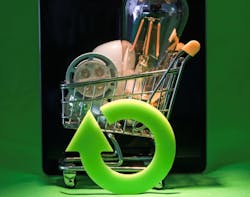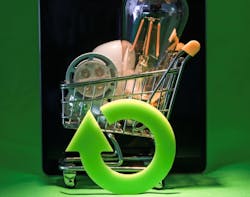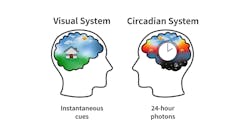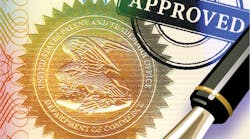More than 20% of LED lamps fall afoul in the UK, according to one group, which notes that the country’s Amazon website is heavily stocked with non-compliant bulbs.
Up to 10% of electrical goods including LED lamps sold online in OECD countries violate environmental regulations, and, LEDs Magazine has learned, one of the worst offenders is Amazon’s UK website, where 76% of bulbs sold by 120 sellers in one search failed to comply with a law governing disposal and reusable materials.
Interested in articles & announcements on LED regulations and recycling issues?
Those are the headline findings of a couple of reports, one by the OECD (Organisation for Economic Co-operation and Development) looking at Waste Electrical and Electronic Equipment (WEEE) compliance across its 36 member countries, and the other by a UK trade group known as the WEEE Scheme Forum.
The OECD report examined a practice it calls “freeriding,” which is the tendency for online sites to sell goods that do not comply with the environmental regulations of the country where the online site does business. The products in question often come from another country, such as China.
Paris-based OECD did not break down product categories but pointed out that freeriding applies across a wide range of products, including LED bulbs as well as laptops, tablets, phones, electric toothbrushes, and other small consumer electronic items, as well as large appliances.
Although large appliances tend to be less of a problem, the smaller stuff including LED bulbs are often slipping past regulatory oversight.
How green is my basket? Not always the greenest when purchased online, the OECD finds.
“While speculative, as there is no hard data, the available information indicates that the overall scale of the online free-rider issue is likely to be between 5% and 10% of the OECD Electrical and Electronic Equipment market,” the OECD report found. Suggesting that the problem is likely to worsen, it noted, “Online sales are of course growing, and there is significant variation from one territory to another and from one product category to another.”
One country where the problem is thought to be rampant in the LED sector is the UK, where recycling company Recolight has estimated that more than 20% of LED lamps sold online fail to comply with the nation’s WEEE law. WEEE directives come from the European Union, and each of the EU countries enacts its own WEEE statutes, mandating procedures and rules for electrical waste, disposal, recycling, and reusable materials.
Recolight was a key contributor to the OECD report, which backed up the 20% assertion. Recolight has also spearheaded ongoing investigations into freeriding practices, and it has contributed to a probe by the WEEE Scheme Forum (WSF), which has singled out Amazon’s UK operation as an example of how lax online sites can be in overseeing compliance.
The WSF found that the first 120 LED vendors listed on Amazon UK were not registered as WEEE-compliant, Recolight CEO Nigel Harvey told LEDs. Failure to register as WEEE-compliant is itself is a violation.
LEDs requested a comment from Amazon but had not heard back by the time this article was published.
“Research undertaken by the WEEE Scheme Forum shows that smaller products, such as LED lamps, are much more likely to be non-compliant when sold through online fulfillment houses, such as Amazon,” Harvey said. “That is probably because consumers feel more confident in buying small products online, including those from unknown brands.”
The WSF research uncovered 91 different LED lamp products that were not registered (presumably the 120 vendors sold some of the same products), representing about 76% of LED lamps on the site. Of the 91 unregistered LED products, 74 came from China including Hong Kong, 15 from the EU, and 2 from the US. Demonstrating the general scope of the problem, fitness watches were even worse, with 88% of the products unregistered, WSF found. Power tools came in at around 54% unregistered, hair care products at 50%, and tablet computers at 40%
“The report was based on sales into the UK only, but it seems reasonable to assume that a similar situation exists in similar markets,” Harvey said.
Amazon is by no means the only site letting free riders slip through, as the OECD reported a widespread lack of what it called “Extended Producer Responsibility” (EPR), which makes a producer responsible for the environmental impact of its product from cradle to grave — a kindred spirit to WEEE, and all part of the circular economy.
“Extended Producers Responsibility systems aim to make producers responsible for the environmental impacts of their products throughout the product chain, from design to the end-of-life phase,” the OECD wrote in its 59-page report. “With about 400 EPR systems currently in operation across the globe, most of them in OECD member countries, these policies have become one of the key approaches in this area. While these systems have helped to increase recycling and collection rates, as well as generating financial resources to pay for these activities, governments are grappling with a number of issues that hinder their effectiveness and efficiency.
“One of these issues is free-riding of producers or retailers, which the fast expansion of online sales in recent years has been exacerbating. Online sales are creating new free-riding opportunities as consumers are able to buy more easily from sellers in other countries. These sellers often have no physical, legal entity in the country where the consumer resides, and are not registered with national or local EPR schemes. The consequence is that they avoid producer and retailer/distributor obligations and costs.”
In its report, the OECD proposes a wide range of measures to shore up practices, involving all stakeholders including governments, online sites and manufacturers. In noting that the situation is complex, it even suggests that blockchain, the technology behind Bitcoin and other crypto currencies, could play a role in tracking products through the supply chain. It also ponders whether delivery companies should also be held accountable. It ponders the possibility of common inter-governmental regulations, taxes and customs polices.
The OECD’s many suggestions also include a universal logo symbolizing EPR compliance. It also moots the possibility of linking EPR registration to mandatory procedures such as VAT registration.
“The OECD report confirms the large scale of WEEE non-compliance through online marketplaces and fulfillment houses,” said Recolight’s Harvey, who is also vice president of the European lamp recycling outfit EucoLight. “There is an urgent need for regulatory change. The VAT system has been amended to make online fulfillment houses jointly liable for VAT payments for any product they hold in stock in the UK. A similar approach is now needed for WEEE.”
Another suggestion the OECD makes is to treat e-commerce sites as producers, thus requiring the site itself to register to EPR schemes.
For a list of the 36 OECD countries across Europe, the Middle East, Asia and North America, click here.
MARK HALPERis a contributing editor for LEDs Magazine, and an energy, technology, and business journalist ([email protected]).






